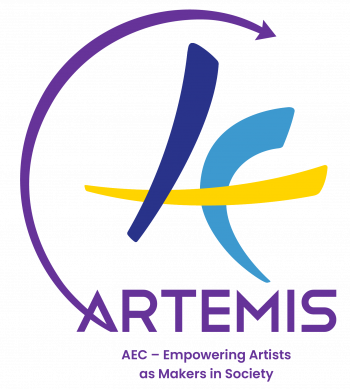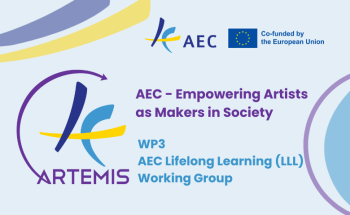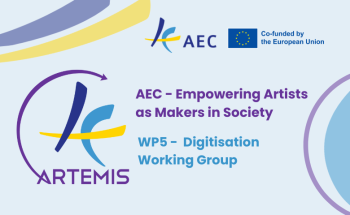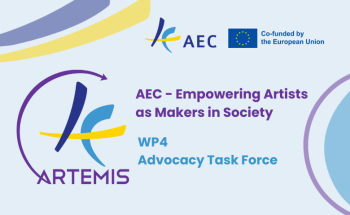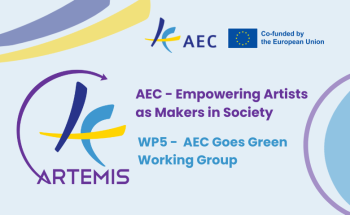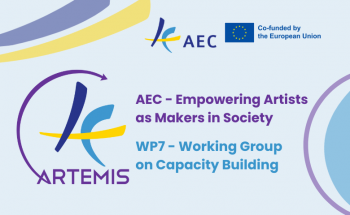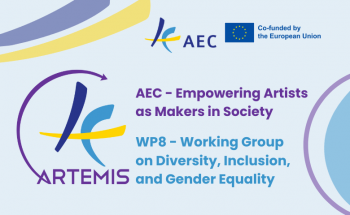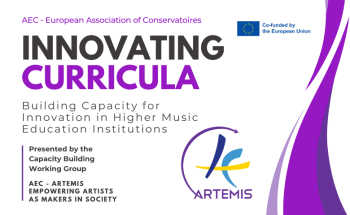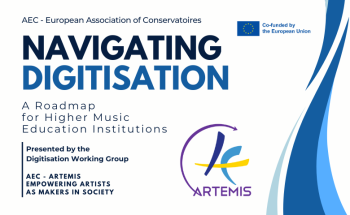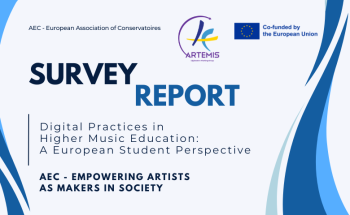WP5. Collecting and disseminating data, information and practices
Objectives Work Package 5
⇒ Establishing a reliable empirical basis for actions aimed to support the project performance and to scale up the HME sector, including in relation to Going Green and Digitisation
Through Work Package 5 (WP5), AEC will deepen its knowledge of the sector it represents. In addition, AEC will address the need to assist HMEIs in dealing with the digital shift (which is affecting their own practices and educational methods, as well as the way in which artists interact with their audience). Finally, AEC will provide guidance to the sector on how it can contribute to the burning issue faced by society, i.e. tackling climate change.
- Updating and strengthening the AEC National Overview of Higher Music Education systems
The AEC office with the help of AEC members will update the overview of the HME systems in EHEA countries – which it produced initially in 2010. The task will require rethinking the content of the overview, streamlining it as well as including new fields, such as post-COVID situation, financial and human resources, digitisation, sustainability and acting green, gender equality and genre and human related diversity, LLL. This overview is aimed at providing AEC and its members with a better understanding of the sector they are serving, that can be of assistance to institutions in their debates with policy makers. It will enable AEC to identify gaps between countries and encourage its members.
- Supporting the working groups and the AEC Office with professional expertise when collecting and analysing data
Establishing a help desk run by an external expert in empirical social research to assist the working groups and the AEC office in conducting surveys and interviews, collecting data and analysing and interpreting them. This will strengthen the validity and reliability of the project outcomes.
- Providing AEC members with inspiration and insight to make the sector more sustainable and environment-friendly
The AEC Goes Green WG will:
- Collect practices and ideas from within and outside the AEC membership on how HMEIs can make their daily work and the entire music sector more sustainable
- Collect information from HMEIs leaders on the challenges connected to implementing greener practices and on specific areas in which they would like to get advice e.g. through questionnaires and/or interviews to be prepared together with the expert
- Investigate the link between arts and environment, including the concept of ‘Sustainable Art’, and explore educational and professional concepts in which music contributes to raising ecological and environmental awareness
- Based on collected information, develop guidelines and recommendations for HME institutions and advise AEC on how to change its own operations, events and projects (including the one which is described in this application) into more sustainable ones
Long-term effects: Environmental sustainability of the HME sector: through WP5 in particular, the project aims at changing the current practices within the HME sector, in particular within the institutions which are not yet as environmental-friendly as they should be. In the long-run, this will result into contributing to the fight against climate change and saving the planet.
- Supporting the process of digital transformation in HMEIs
The Digitisation WG will:
- Investigate, further develop and test tools that have been created to enhance digitally supported remote ensemble play (LoLa, Digital Stage)
- Ensure that the digital transformation is appropriately addressed in all parts of the project and, if necessary, provide assistance to all WPs and WGs of the project in this work.
The Digitisation WG will cooperate in particular with the Capacity Building WG (WP7) – which is in charge of exploring digital tools for learning and teaching.
Short-term effects: Adaptation to the digital shift: along with WP3 and WP7, WP5 addresses the digital shifts in several ways. The project aims at providing knowledge and tools to adapt and face the digital shift. The changes/innovations envisaged are first-and-foremost increased distance learning and teaching (tools and practices), enhanced remote ensemble playing.

